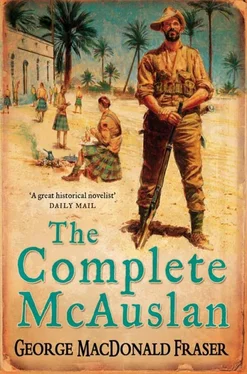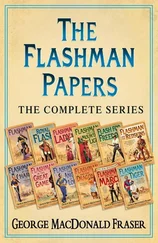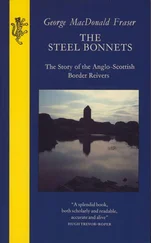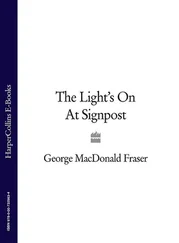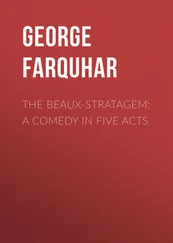THE COMPLETE McAUSLAN
GEORGE MACDONALD FRASER

These novels are entirely a work of fiction. The names, characters and incidents portrayed in them are the work of the author’s imagination. Any resemblance to actual persons, living or dead, events or localities is entirely coincidental.
Harper An imprint of HarperCollins Publishers Ltd. 1 London Bridge Street London SE1 9GF
www.harpercollins.co.uk
The General Danced at Dawn first published by Barrie & Jenkins Ltd. 1970
‘The General Danced at Dawn’ and ‘Guard and the Castle’ were first published in Scotland’s Magazine under the by-line ‘By Dand MacNeill’, and part of ‘Monsoon Selection Board’ in The Red Poppy.
The Sheikh and the Dustbin first published by Collins Harvill 1988
McAuslan in the Rough first published by Barrie & Jenkins Ltd 1970
Copyright © George MacDonald Fraser 1970, 1988, 1974
George MacDonald Fraser asserts the moral right to be identified as the author of these works
A catalogue record for this book is available from the British Library
All rights reserved under International and Pan-American Copyright Conventions. By payment of the required fees, you have been granted the nonexclusive, nontransferable right to access and read the text of this ebook on-screen. No part of this text may be reproduced, transmitted, downloaded, decompiled, reverse engineered, or stored in or introduced into any information storage and retrieval system, in any form or by any means, whether electronic or mechanical, now known or hereinafter invented, without the express written permission of HarperCollins ebooks
HarperCollins Publishers has made every reasonable effort to ensure that any picture content and written content in this ebook has been included or removed in accordance with the contractual and technological constraints in operation at the time of publication
Source ISBN: 9780006513711
Ebook Edition © DECEMBER 2013 ISBN: 9780007325665
Version: 2018-11-01
Cover
Title Page
Copyright
The General Danced at Dawn
Monsoon Selection Board
Silence in the Ranks
Play Up, Play Up, and Get Tore In
Wee Wullie
The General Danced at Dawn
Night Run to Palestine
The Whisky and the Music
Guard at the Castle
Author’s Note
The Sheikh and the Dustbin
The Servant Problem
Captain Errol
The Constipation of O’Brien
The Sheikh and the Dustbin
McAuslan, Lance-Corporal
The Gordon Women
Ye mind Jie Dee, Fletcher?
Extraduction
Author’s Note
Glossary
McAuslan in the Rough
Bo Geesty
Johnnie Cope in the Morning
General Knowledge, Private Information
Parfit Gentil Knight, But
Fly Men
McAuslan in the Rough
His Majesty Says Good-Day
Author’s Note
Glossary
Keep Reading
About the Author
Also by the Author
About the Publisher
THE GENERAL DANCED AT DAWN
GEORGE MACDONALD FRASER
For my father.
Our coal-bunker is old, and it stands beneath an ivy hedge, so that when I go to it in wet weather, I catch the combined smells of damp earth and decaying vegetation. And I can close my eyes and be thousands of miles away, up to my middle in a monsoon ditch in India, with my face pressed against the tall slats of a bamboo fence, and Martin-Duggan standing on my shoulders, swearing at me while the rain pelts down and soaks us. And all around there is mud, and mud, and more mud, until I quit dreaming and come back to the mundane business of getting a shovelful of coal for the sitting-room fire.
It is twenty years and more since I was in India. My battalion was down on the Sittang Bend, trying to stop the remnants of the Japanese Army escaping eastwards out of Burma – why we had to do this no one really understood, because the consensus of opinion was that the sooner Jap escaped the better, and good luck to him. Anyway, the war was nearly over, and one lance-corporal more or less on the battalion strength didn’t make much difference, so they sent me out of the line to see if a War Office Selection Board would adjudge me fit to be commissioned.
I flew out and presented myself to the board, bush-hat on head, beard on chin, kukri on hip, all in sweaty jungle green and as tough as a buttered muffin. Frankly, I had few hopes of being passed. I had been to a board once before, back in England, and had fallen foul of a psychiatrist, a mean-looking little man who bit his nails and asked me if I had an adventurous spirit. (War Office Selection Boards were always asking questions like that.) Of course, I told him I was as adventurous as all get-out, and he helped himself to another piece of nail and said cunningly:
“Then why don’t you sign on to sail on a Norwegian whaler?”
This, in the middle of the war, mark you, to a conscript. So, thinking he was being funny, I replied with equal cunning that I didn’t speak Norwegian, ha-ha. He just loved that; anyway, I didn’t pass.
So I flew out of Burma without illusions. This particular board had a tough reputation; last time, the rumour went, they had passed only three candidates out of thirty. I looked round at my fellow applicants, most of whom had at least three stripes and seemed to be full of confidence, initiative, leadership, and flannel – qualities that Selection Boards lap up like gravy – and decided that whoever was successful this time it wasn’t going to be me. There were two other Fourteenth Army infantrymen, Martin-Duggan and Hayhurst, and the three of us, being rabble, naturally drifted together.
I should explain about Selection Boards. They lasted about three days, during which time the candidates were put through a series of written and practical tests, and the Board officers just watched and made notes. Then there were interviews and discussions, and all the time you were being assessed and graded, and at the finish you were told whether you were in or out. If in, you went to an Officer Cadet Training Unit where they trained you for six months and then gave you your commission; if out, back to your unit.
But the thing that was universally agreed was that there was no known way of ensuring success before a Selection Board. There were no standard right answers to their questions, because their methods were all supposed to be deeply psychological. The general view throughout the Army was that they weren’t fit to select bus conductors, let alone officers, but that is by the way.
One of the most unpleasant features of a Selection Board was that you were on test literally all the time. At meal times, for instance, there was an examining officer at each table of about six candidates, so we all drank our soup with exaggerated care, offered each other the salt with ponderous politeness, and talked on a plane so lofty that by comparison a conversation in the Athenaeum Club would have sounded like an argument in a gin-mill. And all the time our examiner, a smooth, beady gentleman, kept an eye on us and weighed us up while pretending to be a boon companion.
It wasn’t too easy for him, for at our second meal I displayed such zeal in offering him a bottle of sauce that I put it in his lap. I saw my chances fading from that moment, and by the time we fell in outside for our first practical test my nerves were in rags.
It was one of those idiotic problems where six of you are given a log, representing a big gun-barrel, and have to get it across a river with the aid of a few ropes and poles. No one is put in command; you just have to cooperate, and the examiners hover around to see who displays most initiative, leadership, ingenuity, and what-have-you. The result is that everyone starts in at once telling the rest what to do. I had been there before, so I let them argue and tried to impress the Board by being practical. I cleverly tied a rope round the log, and barked a sharp command to Martin-Duggan and Hayhurst. They tugged on the rope and the whole damned thing went into the river. At this there was a deadly silence broken only by the audible scribbling of the examiners, and then the three of us sheepishly climbed down the bank to begin salvage operations.
Читать дальше
